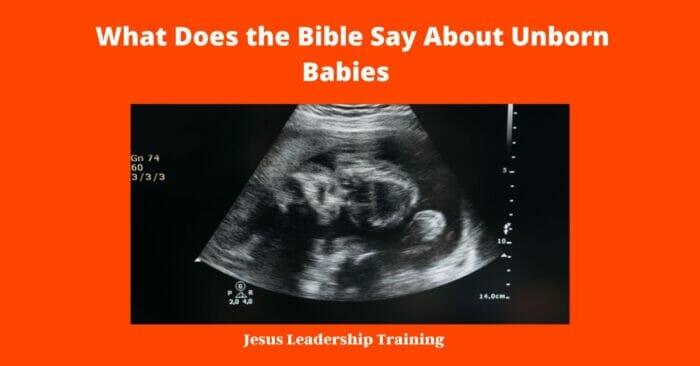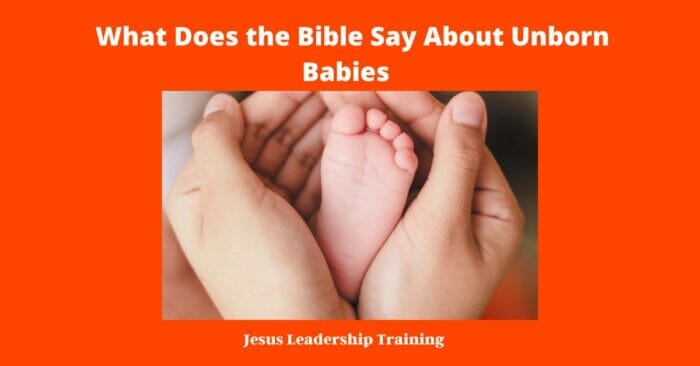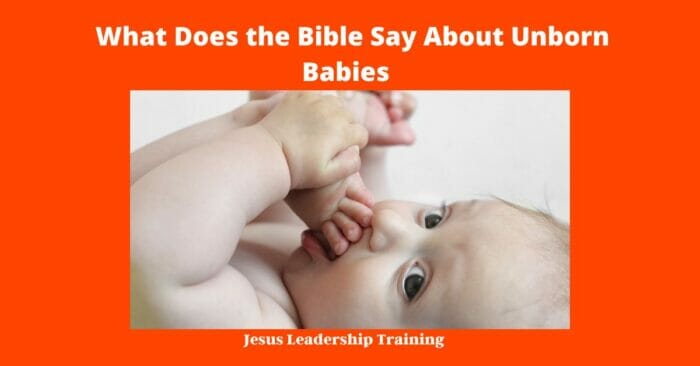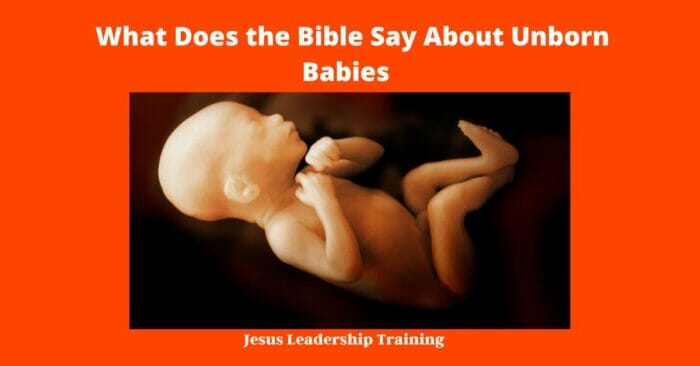What Does the Bible Say About Unborn Babies – The Bible holds a special place in the hearts and minds of millions of people worldwide; it is a source of comfort and guidance in times of uncertainty. In regard to unborn babies, the Bible offers a great deal of insight. While there are numerous verses that refer to unborn children, the Bible speaks to the value and sanctity of life starting in the womb.
In Psalm 139:13, the Bible states “For you created my inmost being; you knit me together in my mother’s womb.” This passage emphasizes that God knew and loved the unborn baby even before their birth. Furthermore, the Bible outlines that human life starts in the womb, with Jeremiah 1:5 stating “Before I formed you in the womb I knew you, before you were born I set you apart.” These passages illustrate how God views unborn babies as valuable and worthy of love.
Table of Contents
What Does the Bible Say About Unborn Babies
The Bible is the most influential book in the history of the world and it has been used to guide and shape the beliefs of billions of people for thousands of years. It contains many references to unborn babies and their value in the eyes of God. The Bible teaches us that unborn babies are valuable, loved by God, and deserving of protection. In this blog post, we will explore what the Bible says about unborn babies and their value in God’s eyes.
Understanding the Bible’s Perspective on Unborn Babies
The Bible is clear in its teachings that unborn babies are valuable and sacred in the eyes of God. In Psalm 139:13-16, the psalmist declares: “For you created my inmost being; you knit me together in my mother’s womb. I praise you because I am fearfully and wonderfully made; your works are wonderful, I know that full well. My frame was not hidden from you when I was made in the secret place. When I was woven together in the depths of the earth, your eyes saw my unformed body. All the days ordained for me were written in your book before one of them came to be.” This passage shows us that God is aware of us even before we are born, and that He has plans for us before we even take our first breath.

The Sanctity of Life: What the Bible Says About Unborn Babies
The Bible also speaks of the sanctity of life, and how unborn babies are worthy of protection. In Deuteronomy 27:25, God declares: “Cursed is the one who takes the life of an innocent person.” This passage shows us that God views the taking of a human life, even the life of an unborn baby, as a serious sin.
Protecting the Innocent: The Bible’s Teachings on Unborn Babies
The Bible also speaks of the importance of protecting the innocent, and how unborn babies deserve to be protected. In Psalm 82:3-4, God says: “Give justice to the weak and the fatherless; maintain the right of the afflicted and the destitute. Rescue the weak and the needy; deliver them from the hand of the wicked.” This passage emphasizes the importance of protecting those who are most vulnerable, and unborn babies are certainly included in this category.
Example of babies being Murdered in the Bible
In the Bible, there are multiple examples of babies being murdered, whether it be by a ruler or a jealous husband or even an angel. These examples of babies who were killed can be seen as a warning to all of us to follow God’s commands, instead of allowing ourselves to be overcome by our own passions.
The first example of babies being murdered in the Bible can be seen in the story of Pharaoh in the Book of Exodus. After the Israelites had been enslaved in Egypt, Pharaoh ordered the midwives to kill all the male Hebrew babies, as he was afraid that the population would overtake the Egyptians. However, the midwives disobeyed Pharaoh and allowed the babies to live.

The second example can be seen in the Book of Numbers, when a jealous husband named Simeon killed an Egyptian man who had married his daughter. When his daughter confronted him about the murder, Simeon said that he killed the man because he was afraid that the man would hurt her unborn child.
The third example is found in the Book of Judges, when an angel of the Lord killed 185,000 Assyrian soldiers in one night.
The final example of babies being murdered in the Bible is when King Herod ordered the killing of all the male babies in Bethlehem, in an attempt to kill the newborn Jesus. Fortunately, Jesus was able to escape and the other babies were spared.
These examples of babies being murdered in the Bible can serve as a reminder to us all to honor God’s commands and to not let our own passions get in the way. We should strive to follow God’s will, even if it means sacrificing our own desires.

Bible Verses on Unborn Babies and the Womb
The Bible also speaks of the special relationship between a mother and her unborn baby. In Isaiah 49:15, the prophet declares: “Can a mother forget the baby at her breast and have no compassion on the child she has borne? Though she may forget, I will not forget you!” This passage shows us that God is aware of the special bond between a mother and her unborn baby, and He will never forget them.
The Bible’s View on Abortion: Killing Babies or Saving Lives?
The Bible speaks clearly on the issue of abortion and it is clear that it views it as the taking of an innocent life. In Exodus 20:13, God declares: “You shall not murder.” This passage shows us that God views the taking of a human life, even the life of an unborn baby, as a serious sin.
The Bible’s View on Human Life: What Does it Say About Unborn Babies?
The Bible also speaks of the importance of human life and the value of unborn babies. In Psalm 127:3-5, it says: “Sons are a heritage from the Lord, children a reward from him. Like arrows in the hands of a warrior are sons born in one’s youth. Blessed is the man whose quiver is full of them. They will not be put to shame when they contend with their enemies in the gate.” This passage shows us that children, including unborn babies, are a gift from God and should be protected and cherished.
What the Bible Reveals About Unborn Babies and Children
The Bible also speaks of the importance of caring for children, including those who are unborn. In Isaiah 1:17, it says: “Learn to do right; seek justice. Defend the oppressed. Take up the cause of the fatherless; plead the case of the widow.” This passage shows us that God calls us to protect and care for the most vulnerable, including unborn babies.
The Bible’s Teachings on the Value of Unborn Babies
The Bible also speaks of the value of unborn babies in God’s eyes. In Jeremiah 1:5, it says: “Before I formed you in the womb I knew you, before you were born I set you apart; I appointed you as a prophet to the nations.” This passage shows us that God has plans for us even before we are born, and that He values and loves us before we even take our first breath.
The Bible’s Message on the Sanctity of Unborn Babies
The Bible also speaks of the sanctity of unborn babies and the importance of protecting them. In Proverbs 24:11-12, it says: “Rescue those being led away to death; hold back those staggering toward slaughter. If you say, ‘But we knew nothing about this,’ does not he who weighs the heart perceive it?
Does not he who guards your life know it? Will he not repay everyone according to what they have done?” This passage shows us that God is aware of the lives of unborn babies, and that He will hold us accountable for how we care for them.
How Does the Bible Describe Unborn Babies?
The Bible also speaks of how unborn babies are described in God’s eyes. In Psalm 139:13-16, the psalmist declares: “For you created my inmost being; you knit me together in my mother’s womb. I praise you because I am fearfully and wonderfully made; your works are wonderful, I know that full well.
My frame was not hidden from you when I was made in the secret place. When I was woven together in the depths of the earth, your eyes saw my unformed body. All the days ordained for me were written in your book before one of them came to be.” This passage shows us that God is aware of us even before we are born, and that He has plans for us before we even take our first breath.
List of Hebrew Words that Translate Unborn Babies
- Yeled (ילד): This Hebrew word translates to “child” or “offspring” and is often used to refer to unborn babies.
- Bria (בריאה): This is a Hebrew word meaning “fetus” or “unborn baby.”
- Haolam Haba (העולם הבא): This Hebrew phrase translates to “the world to come” and is used to refer to unborn babies in the Jewish faith.
- L’Gufa (לגופה): This Hebrew word means “in the body” and is often used to refer to unborn babies.
- Mitzad (מצד): This Hebrew word translates to “side” and is used to refer to the unborn baby in the womb.
- Meyaledet (מיילדת): This Hebrew word translates to “birth-giver” and is often used to refer to pregnant women.
- Chayal (חייל): This Hebrew word translates to “soldier” and is used to refer to unborn babies in the Jewish faith.
- Nefesh (נפש): This Hebrew word translates to “soul” and is used to refer to unborn babies in the Jewish faith.
- M’chalel (מכלל): This Hebrew word translates to “sprout” and is used to refer to unborn babies in the Jewish faith.
- Tzur (צור): This Hebrew word translates to “rock” and is often used to refer to unborn babies in the Jewish faith.
List of Greek Words that Translate Unborn Babies
- Brephos (Greek: βρέφος): Unborn baby, fetus, or infant.
- Embryon (Greek: ἔμβρυον): Unborn or developing baby.
- Parthénos (Greek: παρθένος): Literally translated as “virgin”, but can also be used to refer to an unborn baby.
- Taphos (Greek: τάφος): Unborn baby or fetus.
- Apostomos (Greek: ἀπόστομος): An unborn baby, literally meaning “without a mouth”.
- Gaster (Greek: γαστήρ): Literally meaning “belly”, this term is used to refer to an unborn baby.
- Neo (Greek: νέο): Used to refer to a newborn baby or an unborn baby.
- Nous (Greek: νοῦς): Literally meaning “mind”, this term is used to refer to an unborn baby or the mind of an unborn baby.
- Prónoia (Greek: πρόνοια): Literally meaning “foresight”, this term is used to refer to an unborn baby or the future of an unborn baby.
- Chorion (Greek: χώριον): Literally meaning “space”, this term is used to refer to the womb or the area in which an unborn baby resides.
List of Aramaic Words that Translate Unborn Babies
- Qayam (קים): This Aramaic word translates to ‘unborn baby’ and is derived from the root q-y-m, which means ‘to stand’.
- B’kor (בכור): This Aramaic word translates to ‘firstborn’ and is derived from the root b-k-r, which means ‘to open’.
- Raz (רז): This Aramaic word translates to ‘secret’ and is derived from the root r-z, which means ‘to hide’.
- Melek (מלך): This Aramaic word translates to ‘king’ and is derived from the root m-l-k, which means ‘to rule’.
- Torah (תורה): This Aramaic word translates to ‘teaching’ and is derived from the root t-r-h, which means ‘to instruct’.
- Nechamah (נחמה): This Aramaic word translates to ‘comfort’ and is derived from the root n-ch-m, which means ‘to soothe’.
- Shlom (שלום): This Aramaic word translates to ‘peace’ and is derived from the root sh-l-m, which means ‘to be complete’.
- Yerushalayim (ירושלים): This Aramaic word translates to ‘Jerusalem’ and is derived from the root y-r-sh, which means ‘to inherit’.
- Kedem (קדם): This Aramaic word translates to ‘east’ and is derived from the root k-d-m, which means ‘to go before’.
- Nelyah (נליה): This Aramaic word translates to ‘hope’ and is derived from the root n-l-h, which means ‘to wait’.
Bible Verses on the Value of Unborn Babies
The Bible also speaks of the value of unborn babies and how they are precious in God’s eyes. In Psalm 127:3-5, it says: “Sons are a heritage from the Lord, children a reward from him. Like arrows in the hands of a warrior are sons born in one’s youth. Blessed is the man whose quiver is full of them. They will not be put to shame when they contend with their enemies in the gate.” This passage shows us that children, including unborn babies, are a gift from God and should be protected and cherished.
What Can We Learn From the Bible About Unborn Babies?
The Bible teaches us many important lessons about unborn babies. We learn that unborn babies are valuable, loved by God, and deserving of protection. We also learn that God is aware of us even before we are born, and that He has plans for us before we even take our first breath. Finally, we learn that God is calling us to protect and care for the most vulnerable, including unborn babies.
What Does the Bible Say About Protecting Unborn Babies?
The Bible speaks clearly about protecting unborn babies. In Deuteronomy 27:25, God declares: “Cursed is the one who takes the life of an innocent person.” This passage shows us that God views the taking of a human life, even the life of an unborn baby, as a serious sin. In Psalm 82:3-4, God says: “Give justice to the weak and the fatherless; maintain the right of the afflicted and the destitute. Rescue the weak and the needy; deliver them from the hand of the wicked.” This passage emphasizes the importance of protecting those who are most vulnerable, and unborn babies are certainly included in this category.
What Does the Bible Say About Unborn Babies and Life?
The Bible speaks of the importance of life and of unborn babies. In Psalm 127:3-5, it says: “Sons are a heritage from the Lord, children a reward from him. Like arrows in the hands of a warrior are sons born in one’s youth. Blessed is the man whose quiver is full of them. They will not be put to shame when they contend with their enemies in the gate.”
This passage shows us that children, including unborn babies, are a gift from God and should be protected and cherished. In Psalm 139:13-16, the psalmist declares: “For you created my inmost being; you knit me together in my mother’s womb. I praise you because I am fearfully and wonderfully made; your works are wonderful, I know that full well. My frame was not hidden from you when I was made in the secret place.
When I was woven together in the depths of the earth, your eyes saw my unformed body. All the days ordained for me were written in your book before one of them came to be.” This passage shows us that God is aware of us even before we are born, and that He has plans for us before we even take our first breath.
Final Thoughts – What Does the Bible Say About Unborn Babies
This blog post explored what the Bible says about unborn babies and their value in God’s eyes. The Bible speaks clearly on the issue of abortion and it is clear that it views it as the taking of an innocent life. It also speaks of the sanctity of life, and how unborn babies are worthy of protection.
It speaks of the importance of protecting the innocent, and how unborn babies deserve to be protected. It also speaks of the special relationship between a mother and her unborn baby, and the value of unborn babies in God’s eyes. Lastly, it speaks of how unborn babies are described in God’s eyes and the importance of caring for them. From the Bible, we can learn that unborn babies are valuable, loved by God, and deserving of protection.




